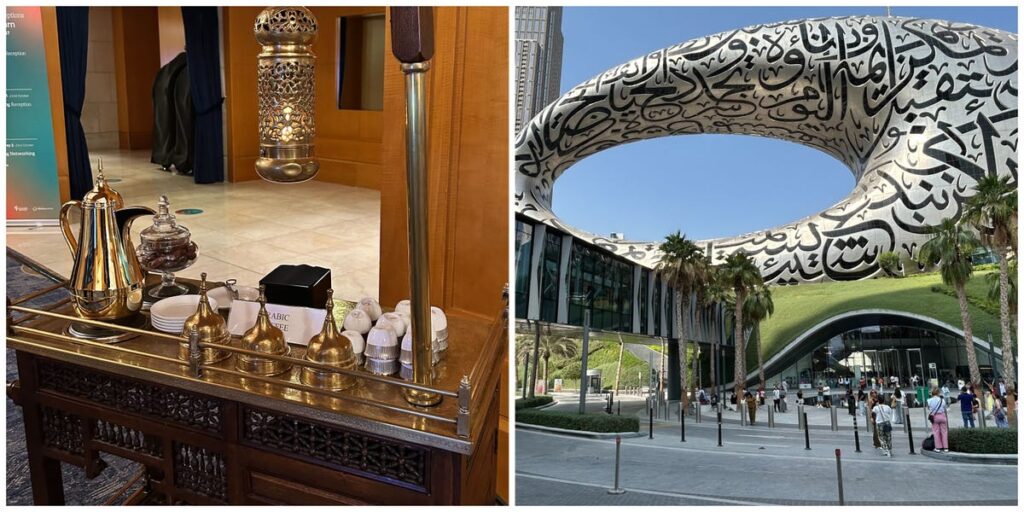For asset managers, the Middle East is the place to be.
Funds seeking capital can pitch their strategies to some of the world’s largest sovereign wealth funds and family offices, which collectively run trillions in assets. Managers searching for a geography with growth potential and limited competition are increasingly spending time in countries such as the United Arab Emirates.
But operating in the Gulf is not the same as working in New York or London, warns Viraj Sawhney, head of Middle East private equity for Warburg Pincus.
The region “feels more like the East than the West,” said Sawhney, who lived in Asia before relocating to Dubai. At SuperReturn Middle East — a private capital conference in the UAE’s largest city — he noted that local references and long-term relationships matter more than flashy PowerPoint presentations.
Transactions and fundraising are relationship-driven, according to both fund allocators and investing professionals.
“So many GPs fly in for a day and expect a check at the end of the day,” said Awaiz Patni, chief financial officer of a Saudi Arabia-based family office, at the SuperReturn conference.
“Money will only come if you build a relationship,” he said.
Offices aren’t necessary, but you have to visit
Millennium, Brevan Howard, Schonfeld, and ExodusPoint are just a few of the hedge funds that have opened offices in either Abu Dhabi or Dubai. Many funds have also been driven to open offices in the region because their employees want to live there, thanks to the tax-free status and warm weather.
A local fundraiser for emerging hedge funds in Dubai, who spoke anonymously because his firm does not allow them to speak publicly, said the notion that the region’s sovereign wealth funds require a physical office to get capital is misguided.
Indeed, Mark Oshida, the regional head of the Middle East and Africa for the consulting firm Cambridge Associates, said his firm has counted many of the large sovereigns as clients for years, but they never pushed the organization to hang a shingle in the country.
Oshida, who moved to Dubai in April, said the organization decided to have a physical presence once it started working with more local family offices, including many run by Europeans or Asians who relocated to take advantage of the tax benefits.
Even if an actual office isn’t required, fundraisers and investors in the region both say that to get money and do deals in the Middle East, you need more than a Zoom call.
“You have to be present, physically present,” Sawhney said.
Charles Myers, the founder of research firm Signum Global Advisors, who splits his time between New York and London, began his Wednesday talk at the AIM Summit in Dubai by noting that it was his fifth visit to the Gulf this year.
Some would prefer to just move to the region instead of constantly taking flights from Europe, Asia, or the US, especially if it’s a focus for their firms going forward.
“Our transactions here do take longer than other places,” said Taimoor Labib, founding partner and head of MENA for private equity manager Affirma Capital, at SuperReturn.
Max Burke, a director at Actis who moved to Dubai from London, is a private-equity investor focused on infrastructure projects like data centers. He believes there are plenty of opportunities in the Middle East, but warned at the SuperReturn conference that dealmakers should be prepared for many breakfasts, lunches, coffees, and dinners.
Learn the culture
Learn to love the coffee — which, if it’s traditional, is served unfiltered from a dallah pot — if you come to the Middle East.
While alcohol is now legal and sold in parts of the region, such as Dubai and the Qatari capital Doha, business has been done over coffee for centuries, several locals said.
“You have to study the region from a cultural perspective,” said Khalil Chami, CFO of Ali & Sons, a Dubai-based conglomerate that also invests through international asset managers, at SuperReturn.
“If you’re just here for a transaction, we can tell,” he added.
Even in a Westernized city like Dubai, traditions matter. SuperReturn rolled out an Arabic coffee cart for attendees. One fundraiser for an international firm, who lives in London and asked to remain anonymous, said they also make a point of telling any Middle Easterners they meet with that they buy coffee from the region to bring home to their family.
The long timelines to make decisions are not just because they want to frustrate visitors, several locals said.
“We want to see if your values align with ours,” family office executive Patni said.
When a region has the wealth the Middle East does, it brings a certain class of conmen and get-rich-quick dreamers. Spotting scammers is just as important as finding a good opportunity, Chami said.
Warburg’s Sawhney said the three values people looking to do deals in the region should keep in mind are patience, flexibility, and humility.
“We don’t see all three present all the time in the West,” he noted.
And, of course, “get used to Arabic coffee,” Chami said.
Read the full article here


